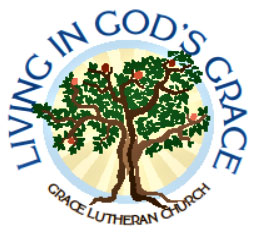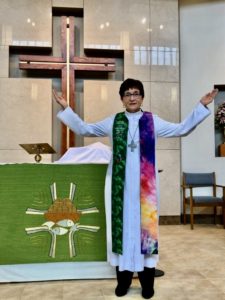The Peace of Christ
“The peace of Christ be with you all.”
“And also with you.”
We share this greeting in a dialogue every week in worship. What always comes to mind as I
hear your response is: “Thank you! I really needed that!”
The Greeting of the Peace, as we call it, is a sacred exchange. In our worship it is technically the
first part of the communion liturgy, as we proclaim ourselves reconciled to each other in the
same way that our opening Confession and Forgiveness proclaims us reconciled to God. For
how can we share the sacrament together if there is any contentiousness among us? We retain
it even on non-communion Sundays because, well, we cannot have too much peace in our lives.
This greeting is akin to the “holy kiss” with which Paul often concludes his letters: “Put things in
order, listen to my appeal, agree with one another, live in peace; and the God of love and peace
will be with you. Greet one another with a holy kiss” (2 Corinthians 13:11-12), or “Greet one
another with a holy kiss. All the churches of Christ greet you” (Romans 16:16).
The Greeting of the Peace is a sacred exchange because we are conveying to one another the
heartfelt hope that “the peace of God, which transcends all understanding, will guard your
hearts and your minds in Christ Jesus” (NIV), or in the nicely accessible Contemporary English.
Translation, the prayer that “because you belong to Christ Jesus, God will bless you with peace
that no one can completely understand. And this peace will control the way you think and feel.”
This is what we are hoping for one another in our greeting: that this deep peace, which
originates at the heart of God’s very being, will govern our lives—how we think, feel, and react,
what we say and what we do. This is why I sign most of my electronic communications with the
word “Peace.” I am always hoping I have conveyed this in what I have just written.
We have had more than our share of turmoil in the past year. Now, as a new front in the
ongoing war against the virus threatens our fragile sense of well-being in community, more
than ever we need to cling to the hope and peace that is ours in Christ.
If we continue to greet one another this way, perhaps we may eventually be able to affirm, with
the late 14th century anchorite and mystic Julian of Norwich, that “All shall be well.” Living selfconfined
in her tiny cell, at the height of her spiritual crisis Julian received a series of revelations
of Christ. Of these she wrote, “But Jesus, who in this vision informed me of all that is needed by
me, answered with these words and said: ‘It was necessary that there should be sin; but all
shall be well, and all shall be well, and all manner of thing shall be well.’ These words were said
most tenderly, showing no manner of blame to me nor to any who shall be saved.”
May the deep peace of knowing our Lord follow you out from worship every Sunday and into
your week.
Pastor Nancy Raabe
Images of God in Prayer

You may have noticed that we have been including the psalm in worship for most of the past several weeks. The Book of Psalms has been called the “prayerbook of the Bible.” These 150 remarkable prayers, each with its own character, have an amazing capacity to address us in the midst of whatever situation in life we are facing at a given time. In our worship life, the psalm is not a “reading” but is a response to the Old Testament reading in a way that anticipates the Gospel reading. It can be thought of as a bridge from the Old Testament to the Gospel. Study the texts on a given week and you will see how that works!
It’s hard for me to pick a favorite psalm. If someone were to ask I’d say “whichever I read most recently.” But Psalm 131, one of the shortest, is especially close to my heart:
O Lord, I am not proud;
I have no haughty looks,
I do not occupy myself
with great matters,
or with things that are
too hard for me.
But I still my soul and make it quiet,
Like a child upon its mother’s breast;
My soul is quieted within me.
O Israel, wait upon the Lord,
From this time forth and forevermore. (ELW translation)
The psalmist invites us set aside all our worldly concerns and become like children, opening ourselves to God in utter trust in God’s loving caretaking. This is especially useful to us now, as we once again face the uncertainty of the pandemic. What are some ways, then, that we can think of God? Who IS God, to each of us?
To Jesus, God was “My Father,” but at times both Jesus and Paul called God “Abba,” an Aramaic word that literally means “Daddy.”
You may be surprised to hear that there are also compelling scriptural images of God as “Mother.” For Isaiah, “God formed me in the womb” (49:5) and God says through the prophet, “As a mother comforts her child, so will I comfort you” (66:13). Human beings, male and female, are made in God’s image (Genesis 1:26-27, 5:1-2). In Matthew we have the beautiful image of Jesus desiring to gather his children to him “as a hen gathers her brood under her wings” (23:37), while John’s Gospel uses a woman in labor as a symbol of the resurrection (16:21).
Early Christian writers bring in maternal images when speaking of God; John Chrysostom, Archbishop of Constantinople (d. 407 AD) names God not only Father but Spouse, Sister, and Mother. Best known, though, are the feminine names for God used regularly by medieval women mystics and especially Julian of Norwich (d. ca. 1416): “But our true mother, Jesus, he alone bears us to joy and to endless living.…”
Our hymnal, Evangelical Lutheran Worship, contains a beautiful hymn based on Julian’s writings, “Mothering God, You Gave Me Birth.”
1 Mothering God, you gave me birth
in the bright morning of this world.
Creator, source of ev’ry breath,
you are my rain, my wind, my sun.
2 Mothering Christ, you took my form,
offering me your food of light,
grain of life, and grape of love,
your very body for my peace.
3 Mothering Spirit, nurt’ring one,
in arms of patience hold me close,
so that in faith I root and grow
until I flow’r, until I know.
As we ask ourselves, “With what shall I come before the Lord…?” (Micah 6 :6), let us open ourselves to new ways of experiencing God that will unleash God’s creative power in each of us. More than ever, the world needs that creativity that resides in each of us to help sustain our community through this time. Amen.
Yours in Christ’s peace,
Pastor Nancy Raabe

